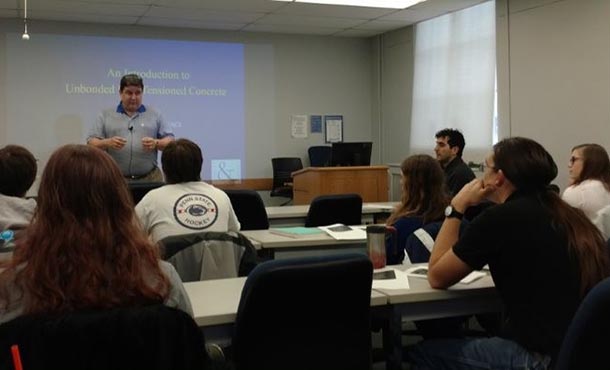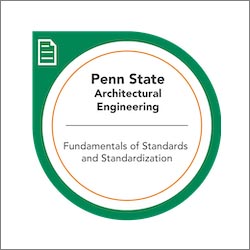
Frank Malits, architectural engineering alumnus and principal with Cagley & Associates, held a micro-credentialing session on post-tensioned concrete design last March. IMAGE: DEPARTMENT OF ARCHITECTURAL ENGINEERING
Architectural engineering announces new micro-credentialing sessions
1/24/2020
By Mariah Chuprinski
UNIVERSITY PARK, Pa. — Micro-credentials are on the rise in the higher education market, and architectural engineering students are some of the first to take part.
Industry representatives, usually Penn State alumni, volunteer their time to present a short course on an industry-specific topic not normally covered in an undergraduate curriculum. Students gather for a few hours on a Saturday or Sunday, listen to a presentation, ask questions and complete a quiz or small assignment that measures their competency in the subject. If an evaluation checks out by the instructor, they receive a credential in the form of a digital badge that they can add to their résumés and LinkedIn profiles — completely free-of-charge.
Micro-credentials are a way for students to show they are equipped to contribute to an industry from their first day on the job, according to Cathy Holsing, director of the College of Engineering’s Office for Digital Learning.
“Students can extend their knowledge beyond the curriculum, making them more competitive for a variety of positions,” Holsing said.
Sez Atamturktur, Harry and Arlene Schell Professor and head of the Department of Architectural Engineering (AE), noted some other benefits.
“Micro-credentials add much needed agility to our robust undergraduate curriculum and allow us to respond to the changing needs of the industry,” she said. “They also allow students to further customize their education and pursue a wide range of interests.”
The Department of Architectural Engineering held several micro-credentialing sessions last year, with more planned for Spring 2020 on topics such as standards and standardization, data center essentials, community planning and retro-commissioning. Sessions can range from just a couple of hours to up to two full days, as determined by the instructor.
“We want to have students as involved as possible in their education,” said Melika Sharifironizi, assistant research professor and micro-credentialing coordinator for AE. “We welcome students’ suggestions for micro-credentialing topics and do our best to bring those ideas to life.”
Frank Malits, a 1987 AE alumnus in the structural option, presented on post-tensioned concrete design in a micro-credentialing session last March.
“Post-tensioned concrete design is a structural concept that is rarely taught on university campuses for undergraduates, usually only offered as a high-level graduate course,” he said. “We went over what I’d call a 50,000-foot overview on what post-tensioned concrete is, and we went through design examples to show how to actually design and implement it.”
A principal at Maryland-based Cagley & Associates, Malits explained that post-tensioned concrete involves installing steel cables in concrete that are then pulled or stretched to create tension after the concrete hardens. The resulting uplift and compression in the concrete increases the capacity to bear more weight with less structural material.
“A slab or beam with post-tensioning is thinner, occupies less space and doesn’t use nearly as much building material,” Malits said. “And in an industry where you’re always trying to reduce your carbon footprint, anything you can do to reduce the volume of building materials is good.”
Malits evaluated students’ understanding through a design project, where he directed them in building analytical models of continuous post-tensioned slabs and beams, which could be completed in about a day. Students had the option to attend a lab the following day to work on their projects, with Malits available to answer questions, or they could finish their projects on their own.
The College of Engineering’s Office for Digital Learning is making it easy for departments like AE to optimize their micro-credentialing offerings through an online platform where students can easily search for, collect and share badges.
“Historically, students would come to a presentation and get a printed certificate, which indicated they went to a presentation and learned about a certain topic,” said Casey Fenton, multimedia specialist with the Office for Digital Learning. “But a platform like the one we are piloting makes credentials easily-sharable, where employers can click on a badge and read exactly what students have learned.”
In the future, the College of Engineering hopes to expand micro-credentialing opportunities to alumni and other external audiences, where participants can continue their lifelong learning through what will be called “University for Life” credentials.
“We want to expand the reach of the College of Engineering to audiences beyond students registered in traditional degree programs, like alumni,” said Peter Butler, associate dean for education and graduate professional programs. “Our micro-credentials provide an outlet for creative instructional ideas that are not constrained by the typical credit or degree educational model.”




